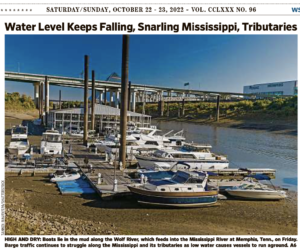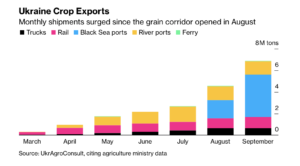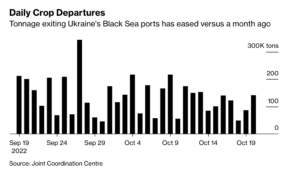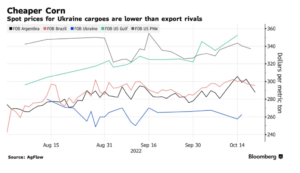Bloomberg's Hallie Gu reported that "China’s grain supply won’t be affected by a loss of US feed grain and oilseed imports, thanks to abundantly available substitutes on the global market…
Mississippi River Barge Traffic “Continued to Struggle,” as “Active and Intensive” Discussions Occur on Black Sea Export Deal
Cameron McWhirter reported in Saturday’s Wall Street Journal that, “Barge traffic continued to struggle along the Mississippi River and its tributaries as low water caused boats and barges to run aground on sandbars up and down the river system. Areas near Memphis and other cities saw record-low river levels this week.
“‘It’s just slowed down to a grinding halt,’ said Gabe Gattle, vice president of transportation for Terral RiverService, a barge com- pany based in Lake Providence, La.”

McWhirter added that, “The low water, caused by a lack of rain in the Ohio River Valley and the Upper Mississippi, is approaching levels not seen in more than three decades, disrupting a vital supply lane for agriculture, oil and building materials. Shipping prices on the river have skyrocketed in recent weeks.
“The U.S. Army Corps of Engineers is conducting emergency dredging at various points on the river to keep traffic moving as much as possible, and the U.S. Coast Guard has imposed restrictions on how much load barges can carry and how many barges towboats can pull. Lisa Parker, spokeswoman for the Corps’ Mississippi Valley Division, said the forecast for the next several weeks isn’t promising: dry weather.”
As water levels drop, barges have difficulty making their way on the river.
— Joshua Stevens (@jscarto) October 21, 2022
Landsat imagery near Vicksburg, Mississippi shows several barges in waiting due to grounding and dredging work.
More in @avoiland’s latest: https://t.co/sbp4XOYsJy pic.twitter.com/8XhDEMunRR
Late last week, Bloomberg writer Kim Chipman reported that, “‘Serious concerns‘ over critically low water levels in the Mississippi River system led port authorities to limit vessel drafts near a key export hub, potentially adding a further headache for shippers already contending with delays and skyrocketing costs.
“The depth of ships’ drafts, or the distance between the waterline and the deepest point of the boat, are now limited to 41 feet upriver of the port of Baton Rouge, the nation’s eighth-largest by tonnage, the US Coast Guard said late Friday. That’s down from 45 feet, a level at which vessels are encountering problems as spreading drought in the US Midwest dries up the waterway, a critical freight artery.”
Barges have run aground along the Mississippi River as water levels drop to record lows. @CharlesPeekWX gives us a firsthand look and explains why this is happening. pic.twitter.com/kboelN5tur
— Pattrn (@pattrn) October 21, 2022
Chipman pointed out that, “As of Saturday morning, there were four waterway closures on the river, the Coast Guard said, with a queue of more than 2,700 barges and vessels waiting at points in Mississippi, Tennessee, and Kentucky. On Friday, the Coast Guard said there were more than 1,800 barges and vessels stuck along the river because of low water levels.”
Dow Jones writer Kirk Maltais reported on Friday that, “Ongoing delays have caused some exporters to delay orders until water levels improve, making a dent in demand for U.S. grain exports.”
Meanwhile, Bloomberg writer Agnieszka de Sousa reported on Friday that, “The uncertainty over whether Ukraine’s Black Sea grain-export deal will be extended has gripped agricultural markets. The current agreement expires in about a month and officials are trying to hammer out new terms and conditions.
“Ukraine is seeking to extend the deal by more than a year and include Mykolayiv as a fourth exporting port, while Russia wants to see a pipeline that takes its ammonia to Odesa for shipment reopened, according to a United Nations official. A UN spokesman this week said there are ‘active and intensive’ discussions, without offering further detail.”
And on Saturday, Bloomberg writer Megan Durisin reported that, “Ukraine’s farmers are getting increasingly nervous that an escalating war could thwart the renewal of a deal that revived crop exports, dealing a blow to local growers and global food prices.”

Durisin noted that, “The UN hailed the deal as a step toward relieving global hunger. More than 300 ships have departed Ukraine’s ports since early August, carrying some 8 million tons of grain, oilseeds and vegetable-oil to Europe, Asia and Africa.

“That’s helped farmers clear some of the backlog created by the war and doubled Ukraine’s monthly crop exports, with the share sold by sea nearing pre-war levels, according to analyst UkrAgroConsult.”

The Bloomberg article added that, “Ukraine’s monthly grain shipments could drop to 3 million to 3.5 million tons if the corridor shuts, less than half their potential if it remains open, UkrAgroConsult estimates.”
New York Times writer James C. McKinley Jr. reported on Friday that, “President Volodymyr Zelensky of Ukraine has accused Russia of deliberately slowing down grain exports to create a food crisis, undermining a deal the United Nations brokered earlier this year that freed millions of tons of food trapped in Ukraine’s ports by the war.
“Mr. Zelensky, in his nightly address to the nation on Friday, said there was a backlog of 150 ships waiting to fulfill contracts to transport Ukrainian wheat, corn, sunflower oil and other products.”
The Times article stated that, “As of Oct. 19, almost 8.8 million tons of grain and other foodstuffs had been exported under the agreement, according to a report issued on Thursday by the U.N. Conference on Trade and Development. Nearly 20 percent of the wheat exports have gone to developing countries, the report said, though that amounts to about 1.3 million tons less than in 2021.”
And yesterday, Reuters writers Ronald Popeski and Humeyra Pamuk reported that, “Ukraine said seven vessels sailed off from its ports on Sunday carrying grain bound for Asia and Europe, but accused Russia of blocking the full implementation of Black Sea grain deal.”
Also yesterday, New York Times writers Carly Olson and James C. McKinley Jr. reported that, “Ukraine’s Infrastructure Ministry again blamed Russia for deliberately slowing grain exports to stymie the U.N.-brokered deal that resumed Ukrainian agricultural exports by sea over the summer, adding fuel to a brewing battle over whether the deal will be extended.
“Ukraine’s three open ports are operating at less than a third of their normal capacity because of Russian interference, the ministry said on Sunday in a statement on Facebook. The Kremlin has not responded to Ukraine’s allegations.”





